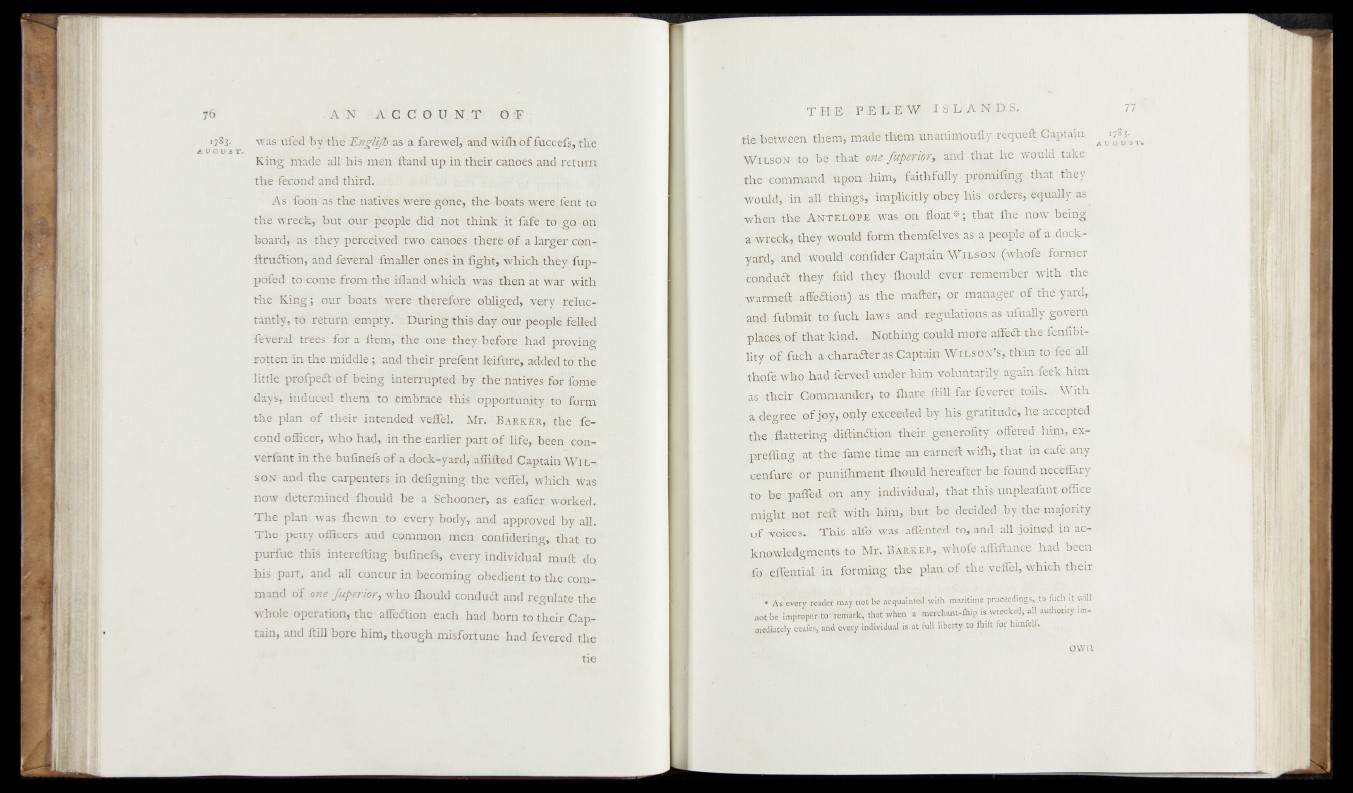
1783- was itfed by the Engli/h as a farewel, and wifh of filccefsythe
>ao st.
King made all his men ftand up in their canoes and return
the fecond and third.
As loott as the natives were gone, the boats were,fent to,
the wreck, hut our people did "not think it' fafe 'toi^ton
board, as- they perceived twojcanoes there of a larger con-
ftru&ion, and fevefal dfmaher ones in light, which they fup-
pofed to come from the illand which was then at war with
the King; xnir boats "were therefore obliged, very reluctantly,
to return empty. During this day our people felled
fe v e r a l trees for a Item, the one th e y before .had proving'
rotten in the middle;, and their prefent Jeifiirej added to' the
little profpe<ft of being interrupted by the natives; fcribme
days, induced them to embrace this opportunity to form
th e plan of their intended vefTel: Mr. Barker,-'-the fe-
cond officer, who had, in the earlier part of life, been cqh-
veffant in the bufinefs o f a dock-yard, affifted Captain Wilso
n and the carpenters in defigning the veflel, which was
now determined fhould be a Schooner, as eafier. wdrked.
The plan was Ihewn to every body, and approved by all.
The petty officers and common men conlidering, that to
purfue this interefting bufinefs, every individual muft dp
his part, and all concur in becoming obedient to the command
o f one fuperioryVfh.0 ffiould conduct and regulate the
whole operation, the affbaion -each had born to their Cap-
tain, and ftill bore him, though misfortune had fevered the
tie
tie between th em , made them unanimoufiy requeft Captain ^
W ilson to b e 'th a t $me fuperior, ahd - that, h e . w ould take
th e command u p o n " h im, fa ith fu lly promifing that th ey
would ,|in .sa il-th ing s, ’.im p h & t iy ^ e y h is f o rd ^ ^ e q u a lly as^
,,whenifthe .A n t e l o p e #asl;on f lo a t * ; that Ihe now b e ing
a-wreck,'•they w o u ld form themfelves a s'a people o f a dock-'
yard, and would confider Captain W il so n fw h o f e . former
eonduft" | th e y Jfsdd th e y fhould -eyer.. remember w ith the
warmeft affeftion) as the ma iler, or manager o f the yard,
and fubmit to fu ch laws, and regulations, as ufually govern
places o f that k in d. N o th ing covdd more afffea the fenfibi-
rKblipf -flicMa 'Cha ra ae f a sCap tain W i l s o n s ,; than taife& aU
thofe wh o had ferved under h im voluntarily again.feek h im
,as their Commander, to fhare ftill far feverer toils. W ith
a degree o f jo y , on ly ex ce ed ed b y his gratitude, he accepted
th e flattering d iftin a ion their generofity offered him, ex-
preffing at the fame time a n eameft wifh, that in.cafe any
cenfure or" puniihment$fhould hereafter be found neceffary
to be paffed on any individual, that this unpleafant office!
m ig h t, not reft w ith h im, bu t be, decided b y th e majority
o f voices. T h is alfo was affented to, and a ll'joined in ax*
knowledgments to Mr. B a r k e r , whofe affiftance had b'eenl
fo j effential in forming th e plan o f the veffel, w h ich their
* As every reader may not be acquainted frith maritime proceedings, to fuch it will
not be improper to remark; that when * merchant-fhip' i s W k e d , authority immediately
ceafes, and every individual is at full liberty to plift for
7/ p
1783- •
G X f S To
own